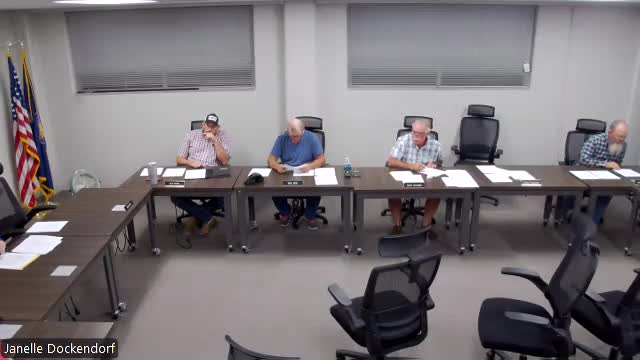Commission hears legal review of hydrogen wells; staff asked to research potential zoning updates
Get AI-powered insights, summaries, and transcripts
Subscribe
Summary
County planning staff and outside counsel briefed the commission on whether hydrogen wells should be treated like oil and natural gas in Dickinson County zoning rules. Commissioners asked staff and counsel to research setbacks, decommissioning and whether the Kansas Corporation Commission regulates hydrogen and return with recommended language.
Planning staff and outside counsel briefed the Dickinson County Planning Commission on Oct. 16 about whether hydrogen extraction or production wells should be treated under existing county rules that govern oil and natural gas wells.
Anna Kurslick, a planning and zoning attorney with the Stinson law firm, told the commission that current Dickinson County zoning regulations list "oil and natural gas" facilities as permitted uses in AG‑80 and AG‑40 districts and that many surrounding counties treat hydrogen similarly to oil and gas. “It is considered a gas, so it would be something that KCC would regulate,” Kurslick said when asked whether the Kansas Corporation Commission would have regulatory authority.
Staff presented two options: modify county code to explicitly include hydrogen wells as permitted uses alongside oil and natural gas, or allow hydrogen as a permitted use but require consultation with the road and bridge department to determine whether a road‑maintenance agreement is necessary during exploration or construction. Tim (Zoning Administrator) said peer counties consulted by staff mostly allow oil, natural gas and hydrogen wells by right in agricultural districts; Jefferson County was an exception that had used a conditional‑use approach while it updates its language.
Commissioners asked for more targeted information before making any code changes. Questions included whether KCC specifically regulates hydrogen wells, whether the county could require setbacks or decommissioning plans, and how road implications and abandoned wells are handled. Kurslick advised that the county cannot duplicate state regulatory authority (Kansas Corporation Commission or KDHE) or impose a permit or fee that state law reserves to the KCC; she agreed to research specific regulatory provisions and report back.
Commission direction to staff included requests to: - Confirm whether the Kansas Corporation Commission or KDHE expressly regulates hydrogen wells and identify statutory citations; - Research whether KCC rules or state law address setbacks, site‑dimensions, decommissioning/plugging requirements and jurisdictional limits; - Draft possible definitions for “oil,” “natural gas” and “hydrogen” and sample regulatory language to add to county provisions (or alternatives that require road‑maintenance consultation); and - Advise whether the county could require road‑maintenance agreements or other measures tied to road repair and decommissioning in practice (noting townships and county road and bridge currently handle road policy and enforcement).
Kurslick and staff agreed to return with findings so the planning commission could consider a resolution or an ordinance amendment at a later meeting. Commissioners framed the work as proactive: accommodating new technologies while respecting KCC/KDHE authority and protecting township roads and taxpayers.
